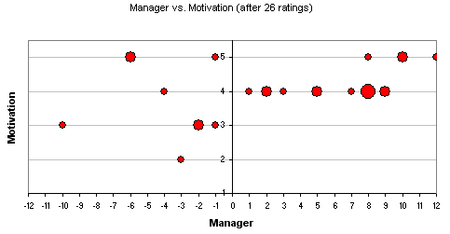People don’t bother with understanding. Really, they don’t. When I tweet something like “Maybe it’s…
You Weren’t Meant to Have a Boss, But It Helps…
When software development gods like Paul Graham tell you that people should not be managed, it makes you wonder what we need bosses for. However, after reading You Weren't Meant to Have a Boss I felt the terrible urge to justify my own position as a manager. (And if this post is not going to convince you, then at least it will make me feel better about myself.)
In his post Paul Graham compares employees to lions. He (rightfully) says that lions are not meant to be kept in zoos, and that lions in the wild seem to be "ten times more alive". (He probably meant "ten times more awake," a statement that, according to research, has some truth in it.) Similarly, Paul says, people are not meant to live in big companies. They seem to be "ten times more alive" as entrepreneurs in small startups.
Unfortunately, Paul's analogy is as far away removed from being accurate, as my mother is from being Yahoo's next CEO.
The small but not important fact that Paul Graham has overlooked is that many of the lions in Africa are living in managed ecosystems. These lions can live their "ten-times-more-lively" lives because there are ecological managers out there who are actually concerned about the well-being of Africa's wildlife. The wild animals that are not being managed find it very hard to survive and thrive in our dangerous world full of looters and poachers.
For entrepreneurs the world of business is just as hard and dangerous. I know. I've been such an entrepreneur. And even though it can be very motivating to be accountable only to yourself, having to take care of your own protection and survival (acquisition, accounting, taxes, lawyers, partners, shareholders, etc.) is a task that's simply too daunting for many of us.
Some weeks ago, in another blog post, I asked readers to rate their motivation on a scale of 1 (bad) to 5 (excellent). I also asked them to rate their manager on a scale of -12 to +12 (using questions from the book First, Break All the Rules). My hypothesis was that bad managers will have both unmotivated and motivated people working with them, while good managers would have more motivated people. Well, here are the results of the test…
I regret that the number of actual respondents to the original post was ridiculously low, as compared to the number of readers. It seems you guys would rather enjoy a good laugh than actually do some honest thinking. Well, never mind. I believe these results are good enough to confirm my theory. There is obviously a correlation between people's motivation and their
judgement of managers. Of course, my interpretation (the causality
working one way) is still just a hypothesis. But as long as someone else has
not been able to falsify it, then my interpretation stands as it is… good managers have only motivated people working with them. Bad managers have both motivated and unmotivated people. It turns out that good managers really make a difference! Bad managers don't, and their people will simply have to motivate themselves (if they can).
Now, I fully agree that people weren't meant to have a boss. But I also agree that, originally, people weren't meant to have a doctor, a dentist, and a hair dresser. (The only ones people were meant to have are their mother and a tax collector.) But having a (good) boss should certainly help people to feel good about their jobs. And of course, how to be a good boss is an entirely different subject altogether. But Paul Graham's conclusion that you're better off not having a boss, is as wrong as Jerry Yang holding hands with Steve Ballmer.
Lions weren't meant to be bossed over by natural reserve managers. But it's certainly helping…
(picture by giordanocapibaribe)
Subscribe to this blog with a reader or by email!
Latest, greatest and favoritest posts:
To Motivate or Not to Demotivate
To Motivate People… Balance Your Practices
Don't Be Bossy!






